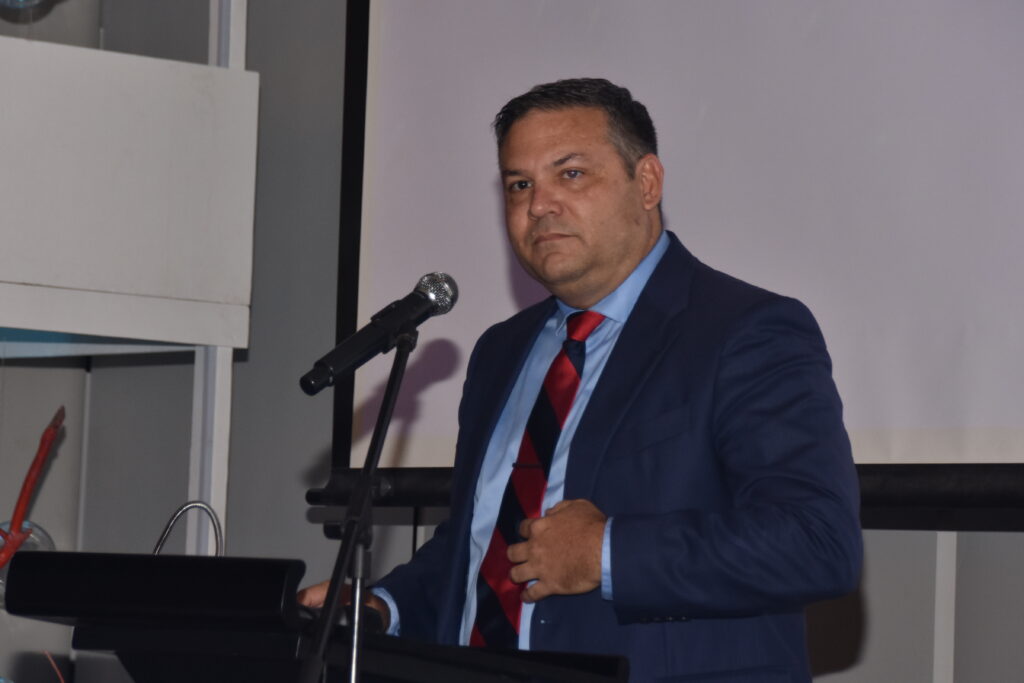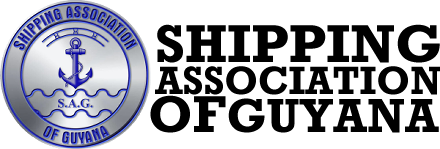
SAG Chairman, Philip Fernandes at SAG Gala Ball 2023
I am pleased to address you on the activities of the Shipping Association of Guyana over the past year and also, in keeping with our theme: “Blue Shipping for a Green Economy” because what we do impacts the blue and green economies that are now so often mentioned. The Shipping Association of Guyana finds itself among this new environment and what a time in history. With the lofty promises of oil to a tiny nation of 750,000 people, many of whom have only known what is called a third world existence. However, it was not the promises newfound wealth through of Oil & Gas that dominated every conversation in recent times, as Covid-19 managed to unexpectedly place a chokehold on the world and on the shipping industry in particular, as we saw huge downward spirals and upward swings in demand and supply during this difficult and challenging period.
Our industry, along with those of manufacturing and retail, will never be the same after Covid-19. The deadly pandemic exposed the weaknesses of our global supply chain, leaving produce rotting at the source, shipping lines perplexed at having cargo containers in the wrong locations, retailers facing longer lead times and higher finance cost for their businesses and consumers, stuck in their homes, awaiting long overdue deliveries. Shipping rates skyrocketed as everyone clamoured to get their cargo on board. With large traders having to resort to entering long-term contracts to ensure they secure bookings, the freight rates, though having dropped off a bit since the peak of the pandemic, are not likely to return to normalcy for quite some time.
Locally concerns were raised by the Guyana Forestry Commission, which anticipates increases in the timber trade, in relation to inadequate capacity for lumber exports. Those concerns emerged from the lack of suitable containers available for lumber exports. The GMSA also expressed concerns of their own that stemmed from the shortage of containers as well as cargo delays. These of course are largely due to the remaining challenges of the pandemic which sees carriers still struggling to clear backlogs of cargo and not having adequate equipment in the right location.
The SAG is being guided by a new five-year Strategic Plan, as there is great need for the Association, and the industry, to keep pace with anticipated development and demand of the new oil and gas industry, which has a heavy dependency on the maritime sector. In addition to direct demands, the projected growth in GDP for the coming years is likely to result in increased cargo traffic which will place greater strain on the current resources of the industry.
Now the landscape has already begun to change with the advent of oil and gas as we witness the emergence of new business opportunities that have attracted investors and competitors from all parts of the world. Some of the issues identified in our current Plan seeks to address:
- Safety and security
- Trade facilitation
- The establishment of a Port Authority
- Improved dredging to increase capacity and enhance Cargo throughput
- The establishment of a deep-water harbor
- Improvement to the existing Maritime legislation to make the ports and shipping industry more responsive to Regional and Global standards
- The reintroduction of the Coast Station that has been out of operation for approximately four decades, and
- The re-alignment of the Ports and Shipping Industry to capitalize on the benefits and opportunities of the Oil and Gas Industry.
This plan revives the proposal which was presented to the government several years ago, that included a possible partnership between the private stakeholders of the industry and the Central government in a Public Private Partnership.
It illustrates the need for the establishment of a modern container handling facility, in a suitable new location, in addition to the dredging and then follow-up maintenance of the channel. The massive undertaking by NRG Holdings to develop a shore base at the mouth of the Demerara river is a great compliment to our industry and Port Georgetown’s ability to receive large cargo-handling vessels.
The dredging exercises that have already been carried out by NRG has already increased the depth of our channel and with the efforts by the government of Guyana to remove several long-standing wrecks has made it much safer.
Other initiatives like the new Demerara Harbour bridge and the Linden/Lethem road have vital roles to play in the development of our local Maritime industry and they need to be developed as part of a holistic plan for the Port of Georgetown. With new opportunities from the emerging oil & gas industry, several of our SAG members, including Muneshwers Ltd, Gaico Construction and General Service, John Fernandes Ltd and new member NRG Holdings along with several others have been making significant investments into property and equipment. We hope that other members are able to follow this lead and position themselves to be ready for likely changes that are still to come.
In addition to the keeping abreast with local developments, SAG hopes to continue its collaboration with the Caribbean Shipping Association and the Caribbean Maritime Institute to explore avenues where our local Maritime personnel can gain access to industry-specific training.
This is of vital importance now as we anticipate an increase in demand for a knowledgeable labour force. Training has been one of the areas of focus for SAG over the years and we continue our efforts to facilitate training based on the needs of our members locally throughout the year and internationally when opportunities are presented through the CSA. SAG teamed up with the MATPAL Marine Institute this year to develop a comprehensive training programme that covers a wide range of areas such as Fire Prevention and Firefighting, Elementary First Aid, ISPS, Basic Safety, Port Facility and Ship Security Awareness to name a few. To date, three of those programs have been successfully run off, well attended and well received by our members.
The Oil & Gas industry has increased our awareness of the need for safety training, not only for hazardous cargo but for new challenges such as the handling and storage of radioactive material and the possibility of oil spills. While we are all conscious of a spill 100 miles offshore in the oilfield, there are also those risks for accidents right here in the channel which can result in spills. On the point of safety, there has been no single greater transformation than in this area in the Port. While we are still getting up to speed with the high standards required for the oil & gas industry, safety standards have increased by leaps and bounds and the level of consciousness is evident in all of our terminals and yards.
During this year, a Tri-Partite Committee comprising the Shipping Association of Guyana, the Maritime Administration Department and the Ministry of Public Works was established to synchronize our ideas. Discussions included Safety and Security, Dredging, Port Development, Pilotage, Maritime Legislation, Demerara Harbour Bridge & Oil and Gas Sector. We also briefly touched on the lack of Anchorage Points in the Demerara Harbour, an issue which is in dire need of attention.
SAG welcomes the development of a Port Authority Act by the Government, as well as the Maritime Insurance and STCW regulations being addressed by MARAD. We also learnt that a Registrar of Ships and Registrar of Seafarers had been hired to ensure that Seafarers were not subject to exploitation. This is indeed a welcome move by the Government.
During the year also, SAG attended two Caribbean Shipping Association’s Annual General Meetings, one held virtually during the pandemic season in January, while the other was an in-person event held in Puerto Rico which was well attended by Shipping Executives eager to return to normalcy. At the January meeting, Dr. Desmond Sears, a Trustee of SAG was elected to serve on the General Council of the CSA for the period 2022 to 2023. Dr. Sears is extremely knowledgeable in Maritime affairs and we fully supported his appointment. SAG’s capacity to host the CSA Annual General Meeting in 2023 came into question during the year due in large measure to a request made to us by that body.
After some rigorous research by our team, we thought that maybe we should plan for 2025 when our hotel industry would have been more than capable of accommodating the more than three hundred and fifty to four hundred delegates and their spouses expected to visit Guyana for that event.
Also worthy of mention is the fact that Ms. Alphea Wiggins, Special Envoy to Barbados’ Prime Minister, paid a courtesy call on the Association, an opportunity which Ms. Wiggins used to learn more about the SAG, and to invite SAG to the Barbados Agricultural Festival, held earlier in the year.
SAG was also involved in discussions and negotiations with the Private Sector Commission where the proposed Single Window system was discussed. This solution has been discussed for a few years now and we are anxious to see it come to the point of implementation. It is our view that such a system is very much needed in Guyana, in order to modernize business and trade in and out of Guyana by improving its efficiency.
These are indeed exciting times. A time to embrace the hard work that presents itself, a time to be bold and brave but careful and measured. This is Guyana’s time.
People working in the maritime industry are among the most extraordinary people. They are brave explorers, dreamers and pioneers. I am proud to have chaired a team of SAG members who are committed to our industry and to Guyana and I look forward with hope to discussing our country’s success with them in the years to come.
